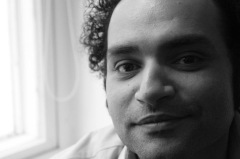If somehow we managed to research the words used most frequently by Egyptians in the past three months, I’m sure “Al-Sisi” would come high up on that list. You can easily recognise the kind of political atmosphere you’re caught in the middle of simply by noticing the reactions of people to the General’s name.
Al-Sisi is indeed the most charismatic figure in Egyptian politics at the moment. He is exceptionally charismatic because there are those who have genuine appreciation and honest admiration of the man, and at the same time he has behind him a relentless media instrument that can’t help being anything but a source of blind, silly and closed-minded propaganda.
Whether Al-Sisi actually asks for such propaganda or doesn’t is another point. I personally believe that this is the only way Egyptian media knows how to deal with charisma; blind propaganda.
The way Al-Sisi was treated since early July is just a perfect explanation of how politics and authority in Egypt is always summed up in an individual. In fact, I would argue that if we closely examine the different factors that have been influential in shaping the outcome of Egypt’s revolution since January 2011, we’d find the most formative to be the post-revolutionary elite.
The factors that commonly influence the outcomes of revolution include things like class structure and its reflection on revolutionary mobilisation. But in both of Egypt’s uprisings in 2011 and 2013 there was no class-based mobilisation; although some would argue that there was an evident upper-middle class presence in June 2013 specifically, it was still quite far from being called class presence. Therefore, it is not social classes that had the most effect on the outcome of revolution in Egypt, probably because class consciousness in Egypt is a lot less than sufficient for social change.
Other factors like the intervention of international actors, the structure of state institutions and ethnic and religious conflicts have not been of equal influence. The place we have reached today has been the effect of post-revolutionary elite (both the Islamist and the security elites) and the control of the state’s coercive apparatus (the police and the army).
To cut a long story short and to keep things simple, what I want to say is that the new phase Egypt’s about to enter is one that will not necessarily be led by Al-Sisi as an individual, but will definitely be engineered by Al-Sisi and his fellow security elite and nurtured by the business elite that has been clearly supportive of the road-map so far.
Mind you, I’m not trying to hint that a new police state is on the rise, or that a military state a la the sixties is about to emerge. What is really on the rise and being formed at the moment is a new alliance between security institutions, the bureaucracy, business elite and post-revolutionary political elite. I do not believe we are witnessing the making of a police state, but rather a very modern, pseudo-representative and security-manipulated democracy.
In a nutshell, whether Al-Sisi ends up being president, or another military or intelligence figure like Murad Mowafi or Hosam Khairallah or whoever else the numerous security institutions of Egypt decide to nominate and end up filling the office, real power will remain in the hands of the deep state institutions – mainly security institutions and the bureaucratic elite.
The fundamental structural problem so inherent within the system in Egypt is far from over. As long as we believe that individuals hold the answer instead of institutions and principles; then we will simply wait for one charisma after the other, a Sisi comes, a Sisi goes; it’s all the same.
What we need to ask is not who will be president, but rather, how will he be president and by who’s support.



